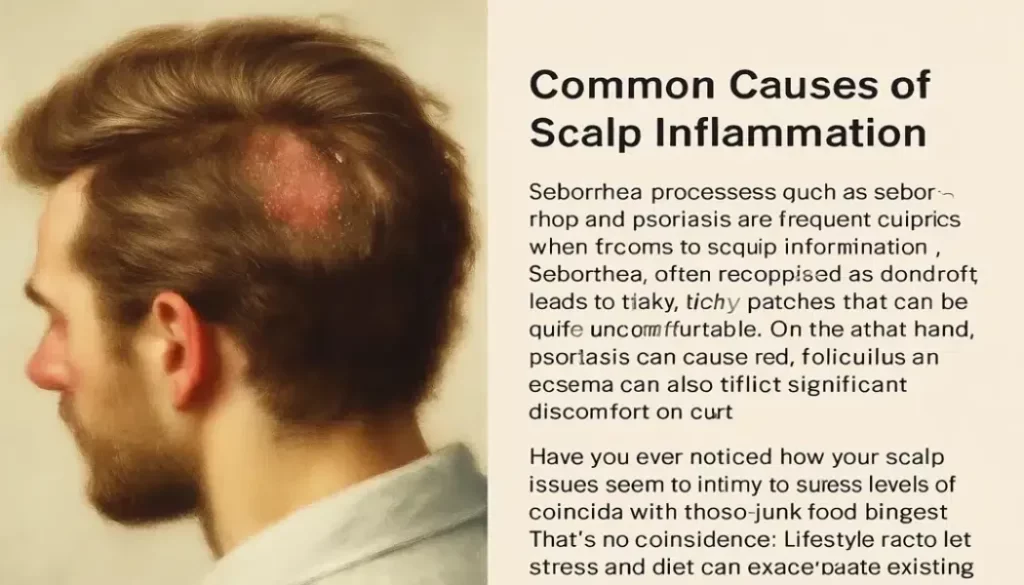Scalp inflammation can really disrupt our daily lives, can’t it? It’s more common than you might think, often manifesting as itchy, flaking skin and sometimes even pain. Getting to know this condition is the first step in tackling it effectively.
🔥 Common Causes of Scalp Inflammation
Inflammatory processes such as seborrhea and psoriasis are frequent culprits when it comes to scalp inflammation. Seborrhea, often recognized as dandruff, leads to flaky, itchy patches that can be quite uncomfortable. On the other hand, psoriasis can cause red, scaly patches that are particularly troublesome for the scalp. Additionally, conditions like folliculitis and eczema can also inflict significant discomfort on our scalps.
Have you ever noticed how your scalp issues seem to mirror your stress levels or coincide with those junk food binges? That’s no coincidence. Lifestyle factors like stress and diet can exacerbate existing conditions, making flare-ups even worse.

🥦 The Role of Nutrition and Deficiencies
What about those pesky vitamin deficiencies? They play a significant role in scalp health. A lack of essential vitamins, particularly B12 and D, can make the scalp more susceptible to inflammation. Ensuring that your vitamin levels are adequate is an important piece of the puzzle when it comes to preventing and managing scalp issues.
Understanding the conditions and their symptoms is crucial, as they directly affect our overall well-being. The discomfort caused by scalp inflammation can seriously impact personal confidence and social interactions. However, knowing what’s going on with our scalps empowers us to take effective action.
⚠️ Identifying Scalp Inflammation Triggers
Scalp inflammation can sometimes feel like a complex puzzle. But understanding the risk factors gives us the power to manage, if not entirely solve, that puzzle.
Let’s discuss those triggers we can actually influence. Stress is at the top of the list—it’s like pouring fuel on the inflammation fire. Similarly, an improper diet packed with junk food and sugar is not just detrimental to your health; it also harms your scalp.

Alcohol consumption also plays a role. While enjoying a glass of wine occasionally won’t doom your scalp, regular drinking can worsen inflammation. And pollution? Living in a smoggy environment can suffocate your scalp, leading to increased irritation.
Now, there are risk factors beyond our control, such as genetics. If your parents dealt with similar hair issues, it’s likely you may too. But don’t worry; genes are just one part of the equation.
Have you ever wondered about the impact of vitamin deficiencies? Vitamins like B12 and D are crucial for maintaining scalp health—without them, the risk of inflammation skyrockets. Being mindful of your diet in relation to these vitamins can lead to significant improvements.
In essence, lifestyle choices heavily influence scalp health. The more risk factors you stack up, the greater your chances of experiencing an inflamed scalp. Fortunately, by tweaking habits related to diet, stress management, and alcohol consumption, you can significantly reduce these risks.
💊 Effective Treatments for Scalp Inflammation
Once we’ve identified those pesky triggers, it’s time to focus on treatments that really work. While managing scalp inflammation may seem daunting, it’s absolutely achievable with the right strategies.
Start with lifestyle changes. Ditching junk food, cutting back on alcohol, and finding effective ways to de-stress can lead to significant improvements in your scalp health. It’s amazing how a few simple adjustments can make everything feel more manageable.

When it comes to medical solutions, a dermatologist is your best ally. They may recommend topical treatments, such as special lotions, which can work wonders in soothing your scalp and promoting healthy hair growth.
For those seeking additional help, consider laser therapy. This non-invasive option promotes hair growth while reducing inflammation—pretty nifty, right?
Supplements also play a vital role in scalp health. There are supplements specifically designed to boost hair health and combat inflammation. Antistress supplements, particularly those derived from plants, can further reinforce the benefits of other treatments.
By addressing both lifestyle and medical needs, you’re setting up a two-pronged approach that not only reduces risk factors but also calms existing inflammation. This holistic strategy ensures that once you tackle the inflammation, you’re better prepared to maintain a healthy scalp.
🌿 Restoring and Maintaining a Healthy Scalp
After tackling the underlying causes of scalp inflammation and trying out effective treatments, maintaining a healthy scalp becomes essential. Think of it as a journey where ongoing management is just as crucial as the initial healing.
Using DHT-blocker lotions can help minimize hair loss and promote growth. These lotions are designed to target hormonal contributors to hair issues, giving your scalp the best chance to thrive.
Hair growth supplements rich in vital nutrients like biotin and zinc provide that extra support. They act as silent allies, keeping your hair strong from the inside out.
Adopting a balanced lifestyle is also crucial. Avoid known inflammatory foods and prioritize a nutritious diet. Keep stress levels in check with calming activities, such as yoga or meditation.
Embrace the process of recovery. Every step you take toward a healthier scalp is a step toward your hair looking its best. “Patience, persistence, and perspiration make an unbeatable combination for success” – sounds about right!

Remember, armed with knowledge and a solid plan, anyone can achieve and maintain a healthy scalp brimming with vitality.

✅ FAQ: Scalp Inflammation — Causes and Treatment Strategies
❓What are the most common causes of scalp inflammation?
Common triggers include fungal overgrowth (like Malassezia), bacterial imbalances, sensitivity to hair products or ingredients, excessive sebum, and skin conditions such as psoriasis, eczema, and dermatitis.
❓Which anti-inflammatory shampoos or ingredients really work?
Look for shampoos containing ketoconazole, zinc pyrithione, salicylic acid, or coal tar for strong anti-inflammatory effects. Natural options with aloe vera, chamomile, and green tea are soothing but best used alongside medicated treatments.
❓Can scalp inflammation be treated naturally?
Yes. Topical applications of aloe vera gel, chamomile compresses, green tea rinses, and diluted tea tree oil can help reduce redness and itch. Combining these with antifungal shampoos enhances effectiveness.
❓When should someone see a dermatologist?
See a dermatologist if inflammation is persistent, spreading, painful, or accompanied by hair loss or bleeding. Prescription treatments such as topical steroids, calcineurin inhibitors, or roflumilast may be needed.
❓How can daily routine help manage inflammation?
Use a gentle, fragrance-free shampoo twice weekly, rinse thoroughly, avoid scratching, and skip harsh chemicals. Follow up with a lightweight serum designed for sensitive scalps.
❓What lifestyle habits support scalp health?
Maintain a balanced diet rich in omega-3s and antioxidants, reduce stress, ensure good sleep, and manage sweat or debris buildup—especially after exercise—to help prevent flare-ups.
🧠 FAQ section added on June 25, 2025, focused on solving scalp inflammation with practical and effective strategies.


Leave a Reply